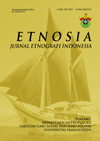Abstract
This article aims to show the phenomenon of Adat as an influential factor in Indonesia's regional election process after the New Order Era. The phenomenon seems to indicate a "local ideology" that fundamentally influences people's political behavior within regional elections. Based on the regional election was in the Toraja regions, Province of South Sulawesi in 2015, this article intends to shows how Adat as the Toraja ethnic group foundation of social identity became the fundamental standard of political behavior. It seems to present Adat as an ideology for the ethnic group where dominantly during the regional election. Ultimately, the view from the Toraja regional election has indicated the possibility of local ideology existence where could be crucial for the local political dynamics. It means the ideology as part of political behavior standard is not only present in its general form as known today. Certain communities could have local ideologies based on their local wisdom, and their context was strictly related to efforts to keep their existence as indigenous people as well as their reclaim as the owner of the land.References
Adams, K.M. (1997). Ethnic Tourism and The renegotiation of Tradition in Tana Toraja (Sulawesi, Indonesia). American Ethnologist, Vol.36, No.4. pp. 309-320, Autumn.
Alfred, T., Corntassel, J. (2005). Being Indigenous: Resurgences against Contemporary Colonialism. Journal Government and Opposition. pp. 597-614.
Ananta., Aris., Arifin, E.N., Hasbullah, M.S., Handayani, N.B., Pramono, A. (2014). Demography of Indonesia's Ethnicity. ISEAS–Yusof Ishak Institute.
Aspinall, E., Fealy, G. (2010). Soeharto's New Order and Its Legacy: Essays in honour of Harold Crouch. ANU Press.
Baruallo, F. (2010). Kebudayaan Toraja (Masa Lalu, Masa Kini dan Masa Mendatang). Universitas Atmajaya-Jakarta.
Burns, P. (1989). The Myth of Adat. Journal of Legal Pluralism. Nr. 28. Pp 1-127.
Davidson, J.S. et.al (ed). (2010). Adat dalam Politik Indonesia. KITLV-Jakarta and Yayasan Pustaka Obor Indonesia.
Henley, D. (2008). In the name of adat: regional perspectives on reform, tradition, and democracy in Indonesia, Modern Asian Studies 42, pp. 815-852.
De Jong, E. (2013). Making a Living Between Crises and Ceremonies in Tana Toraja: The Practice of Everyday Life of a South Sulawesi Highland Community in Indonesia. Brill, Leiden and Boston.
Eklöf, S. (1999). Indonesian Politics in Crisis: The Long Fall of Suharto 1996–98. Nordic Institute of Asian Studies (NIAS).
Emanuel, L. (1999). Latin for Lawyers. The Language of Law. J.D., Harvard Law School 1st Edition. Emanuel Publishing Corp. 328 Boston Post Road • Larchmont, NY.
Gold, J., Thorpe, R., Mumford, A. (eds). (2010). Handbook of Leadership and Management Development. Aldershot: Gower.
Griffin, R. (2006) Ideology and culture. Journal of Political Ideologies. 11:1. pp. 77-99.
Hamilton, M.B. (1987). The Elements of the Concept of Ideology. Political Studies, XXXV. pp. 18-38
Hooe, T.R. (2012). “Little kingdoms” (Adat and inequality in The island, Eastern Indonesia). PhD. Dissertation, University of Pittsburgh, USA.
Kombong, TH. et.al. (1992). Aluk, Adat dan Kebudayaan Toraja dalam Perjumpaannya dengan Injil. Pusbang-Badan pekerja Sinode gereja Toraja.
Lakin, K. (2005). Legal Pluralism in Archaic Greece. December. Stanford Department of Classics & Stanford Law School. (unpublished paper).
Lay, C. (2012). Democratic Transition in Local Indonesia: An Overview of Ten Years Democracy. Jurnal Ilmu Sosial dan Ilmu Politik. Volume 15, Nomor 3, Maret. Pp. 207-219.
Li, T,M. (2000). Articulating Indigenous Identity in Indonesia: Resource Politics and the Tribal Slot. Society for Comparative Study of Society and History. 0010-4175/00/1796–0103.9.50, pp. 149-179.
Liddle, R.W. (1995). Soeharto's Indonesia: Personal Rule and Political Institutions. Pacific Affairs. Vol. 58, No. 1 (Spring). pp. 68-90
Lombard, D. (2005). Nusa Jawa Silang Budaya. Gramedia Pustaka Utama. Jakarta.
Raišienė, A.G. (2014). Leadership and Managerial Competencies in A Contemporary Organization From Standpoint og Bussiness Executives. Economics & Sociology, Vol. 7, No 3. pp. 179-193.
Simblon, P.T. (2007). Menjadi Indonesia. Penerbit Buku Kompas. Jakarta.
Sukri, S. (2016). Democracy and Revivalism of Ethnic Group Identity In the Indonesian Regional Election after Suharto. (Paper) Was Presented at the 24th WorldCongress of Political Science. Poland. (paperroom.ipsa.org/papers/paper_53057.pdf).
________., (2018). The Toraja as an Ethnic Group and Indonesian Democratization Since the Reform Era. (Dissertation) Bonn University, Germany.
Tamma, S. (2018). Pemilihan Kepala Daerah dan eksistensi Komunitas MAsyarakat Adat Toraja. Jurnal Review politik. Vol 7 No. 2 Desember.
Turpel, M.E.. (1992). Indigenous Peoples' Rights of Political Participation and Self-Determination: Recent International Legal Developments and the Continuing Struggle for Recognition. Cornell International Law Journal Vol.5 pp.5879-602.
Twining, W. (2010). Normative and Legal Pluralism : A Global Perspective Normative and Legal Pluralism. Duke Journal of Comparative & International Law. Vol 20. Pp. 473-517.
Tyson, A.D. (2010). Decentralization and Adat Revivalism in Indonesia; The Politics of Becoming Indigeneous. Routledge New York.
United Nations. (1997). The Rights of Indigenous Peoples. United Nations, Fact Sheet No.9 (Rev.1).
Waldron, J. (2002). “Indigeneity? First Peoples and Last Occupancy”. Victoria University of Wellington, Law School Forthcoming. Journal of Public Law. Vol. 1 , pp.1-57.
Waterson, R. (2009). Paths and Rivers; Sa’dan Toraja Society in Transformation. KITLV, Leiden.
Yunus, R., Tamma, S. (2014). Importance of Cultural Legitimacy to the Local Government in Indonesian Democracy. International Journal of Administrative Science and Organization. Volume 21. Number 1. Pp. 27-34.
Szalay, L.B., Rita M.K. (1972). Its Meaning and Measurement. Comparative Political Studies. pp. 151-173.





